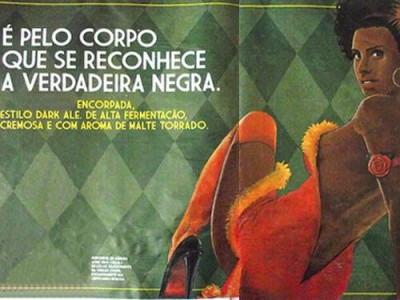
Grada Kilomba (photo used with permission).
This article was written by journalist Carla Fernandes, mentor of Afrolis Radio (“The Africanized Experience of Lisbon“).
In our everyday lives we are often exposed to stereotypical images of all kinds and, a lot of times, we do not even realize it. We have grown used to seeing women as a “sexual object”, the black person as the “criminal” and the immigrant, as “the hassle.”
Grada Kilomba, specialist in the study of racism and post-colonialism at the University of Humboldt, in Berlin, Germany, believes that the media plays an important role in reinforcing racial stereotypes but, on the other hand, there is no open debate on racism in the media.
According to this scholar from São Tomé and Príncipe, mainstream communication constantly shows “images and advertising in which black people appear in the position of the unprotected, dependent, criminal, exotic”. Grada Kilomba also says:
basically we are taught, everyday, who the white people are and the place of the white guy in this society. And who the black is and what place this fellow has in this society.
These statements have been made in a video interview about how to deal with racism in Europe, given to Chris Mckee and Tychicus Vasquez from Ragcha Media.
Representations in the media and alienation
Grada Kilomba pointed out that the consumer market and the movie industry frequently resorted to racial and ethnic stereotypes in order to convey messages that cater to the interests of their producers, without much concern about how they represent minorities in general.
Within the European context, where the black people are a minority, “this is the great trauma for black individuals because they have to constantly identify themselves with white heroes and reject the black characters because they personify evil and criminals. The collective unconscious of blacks is pre-programmed to be in a state of alienation from depersonalization,” argues the expert in the field of racial studies.
Racial stereotypes in advertisements
In the field of advertising, examples of offensive stereotypes can be found across the world. In Brazil, towards the end of 2013, the Ministry of Justice filed a lawsuit against the enterprise Brasil Kirin (former Schincariol) because of its advertisement of the beer called Devassa Negra [Licentious Black, in Portuguese] which displayed the drawing of a black woman with the following sentences: “It is through the body that one recognizes the true black woman. Full bodied Devassa Negra. Style of dark ale of high fermentation. Creamy and with the aroma of toasted malt”.

Advertisement of the beer Devassa Negra.
Complaints and protests from consumers started appearing from early 2010, when the campaign was first launched. Some of the black feminist organizations denounced the advertisement in the Brazilian press, complaining that the advertisement reinforced the image of a hypersexualized black woman.
In Portugal, Zon – an enterprise that offers telecommunication and multimedia services, prepared an outdoor campaign in which a man of oriental features, would say “aplovado” (apploved) instead of “aprovado” (approved) or “o melhol pleço de semple” (the best plice ever) instead of “o melhor preço de sempre” (the best price ever). The campaign, launched in 2013, was considered racist, as it played with the idea of the Japanese businessman, specialized in technology, who is taken in awe for the technological advances of the brand, but who, at the same time, has a hard time speaking Portuguese. The advertisement was seen to be offensive to the members of Asian cultures.
The media can fight against racism
The media can inform, educate, inspire and connect people to unknown realities. They are a mirror of the world that surrounds us and they simulate experiences one has, or could have, as one lives in it. The messages which are conveyed by the media are codified in a fashion that the majority of people can decodify them so as to understand them. One of the most effective ways of codifying information is by the use of stereotypes. It is tantamount to fixing meaning and identity so that they become recognizable and familiar. Nevertheless, stereotypes are no more than over-simplification of the real, and this may lead them to become dangerous allies of racial prejudices as the examples cited above well illustrate. However, in the same time that media helps reinforce racial stereotypes, they can also aid in the fight against racism. Grada Kilomba advocates the idea that black people in Europe could start “taking up the word, remaking books, registering our history, speaking, making films, etc.,” so as to rebuild a positive auto-image, with the help of the same media which denied them this image.
This article was written by journalist Carla Fernandes, mentor of Afrolis Radio (read also: “The Africanized Experience of Lisbon“).







1 comment
Things have changed since 2010. What is more intriguing is the selection of suggested videos on the youtube page where the Kilomba video is nested.